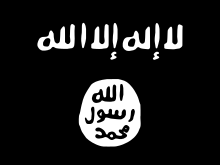Boko Haram
| Boko Haram | |
|---|---|
|
الولاية الإسلامية غرب أفريقيا West Africa Province جماعة أهل السنة للدعوة والجهاد Group of the People of Sunnah for Preaching and Jihad Participant in the Boko Haram insurgency and the War on Terror |
|

The black standard of ISIL
|
|
| Active | 2002–present |
| Ideology |
Wahhabism Salafism Islamic fundamentalism |
| Leaders |
Abu Musab al-Barnawi (POW) (appointed by ISIL) Abubakar Shekau (rival claimant) Mohammed Yusuf † (founder) |
| Headquarters |
|
| Area of operations | Northeast Nigeria, Northern Cameroon, Niger, Chad |
| Strength | At least 15,000 (Amnesty International claimed, January 2015) 20,000 (Chad claimed, March 2015) 4,000–6,000 (US claimed, February 2015) |
| Part of |
|
| Opponents | |
| Battles and wars | |
Boko Haram, referred to by themselves as al-Wilāyat al-Islāmiyya Gharb Afrīqiyyah (Arabic: الولاية الإسلامية غرب أفريقيا, (Islamic State West Africa Province, ISWAP), and Jamā'at Ahl as-Sunnah lid-Da'wah wa'l-Jihād (Arabic: جماعة أهل السنة للدعوة والجهاد, "Group of the People of Sunnah for Preaching and Jihad"), is an Islamic extremist group based in northeastern Nigeria, also active in Chad, Niger and northern Cameroon. The group was led by Abubakar Shekau until August 2016, when he was succeeded by Abu Musab al-Barnawi. The group had alleged links to al-Qaeda, but in March 2015, it announced its allegiance to the Islamic State of Iraq and the Levant (ISIL). Since the current insurgency started in 2009, it has killed 20,000 and displaced 2.3 million from their homes and was ranked as the world's deadliest terror group by the Global Terrorism Index in 2015.
After its founding in 2002, Boko Haram's increasing radicalization led to a violent uprising in July 2009 in which its leader was summarily executed. Its unexpected resurgence, following a mass prison break in September 2010, was accompanied by increasingly sophisticated attacks, initially against soft targets, and progressing in 2011 to include suicide bombings of police buildings and the United Nations office in Abuja. The government's establishment of a state of emergency at the beginning of 2012, extended in the following year to cover the entire northeast of Nigeria, led to an increase in both security force abuses and militant attacks.
...
Wikipedia
